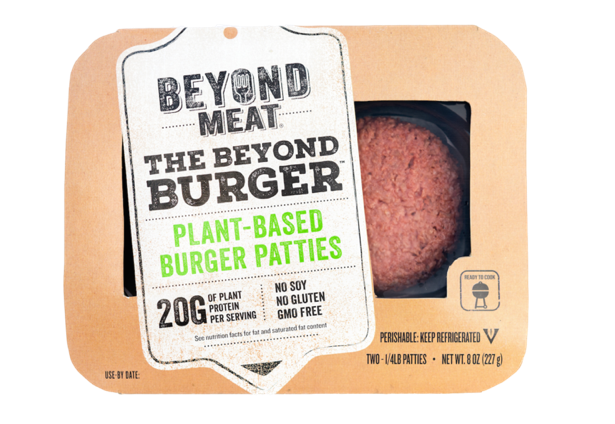A Healthier Alternative to Alternative Meat
Everybody’s talking about the Beyond Burger.
Vegetarians and investors are going crazy over the plant-based patty that looks and feels like real meat.
It’s a full-blown mania.
But if you’re like most of the folks I’ve spoken to, you’re more concerned with these key points…
What’s in it?
And more importantly… Is it good for my health?
We’ll seek to answer both questions today.
In the process, I’ll introduce you to an iron-rich protein that’s great for building muscle and can potentially lower both blood pressure and cholesterol.
It’s the foundation of the Beyond Burger. But don’t worry… there are lots of other (easy) ways to get it into your diet.
So whether you’re curious about the Beyond Meat craze or you’re just looking for a cheap and easy way to boost your health, keep reading.
IF IT LOOKS LIKE A BURGER AND SMELLS LIKE A BURGER… IS IT A BURGER?
The concept of “fake meat” isn’t new.
Boca Foods has manufactured and sold its meat-free take on the hamburger patty since 1979. The brand became so popular in the early 2000s that at one point it was generating more than $70 million in annual sales.

But here’s the thing…Its archrival, Morningstar Farms, achieved similar success. The higher-ups at Kellogg were so impressed with the line of meat alternatives that they paid a whopping $307 million for the company in 1999.
Beyond Meat is different.
Whereas Boca’s and Morningstar’s products are largely soy-based, the Beyond Burger is built on pea protein.
It’s an important distinction.
In the words of Beyond Meat CEO Ethan Brown: “[In] my view, from a consumer perspective, the thing that recommends peas most strongly is what it’s not – and it’s not soy.”1
A HEALTHIER ALTERNATIVE… TO ALTERNATIVE MEAT?
Health-conscious readers are no doubt aware of the problems with soy.
For one thing, it’s rich in isoflavones, which act like estrogen in both men and women. At least one study has found a link between high soy consumption and lower sperm concentration.2
Other studies have pointed out possible links to cancer3 and poor thyroid function.4 And that’s not to mention the fact that more than 90% of the soybeans grown in the U.S. are genetically modified.5
Pea protein, on the other hand, carries none of those risks.
It’s a “complete protein,” which means it carries all nine of the essential amino acids necessary in the human diet. And it’s iron-rich, which makes it a great food for vegetarians or anyone looking to reduce their red meat consumption.
Because it’s produced through the relatively simple process of extracting soluble protein from yellow split peas, it’s also easier to digest than many other plant-based proteins.
For years, athletes have used it as a muscle-building alternative to whey- and soy-based powders. The benefits here are obvious. After one 12-week study, researchers concluded that “pea protein promoted a greater increase of muscle thickness as compared with placebo and especially for people starting or returning to muscular strengthening.”6
There’s also growing evidence that pea protein could lower systolic blood pressure7 and reduce cholesterol levels.8
A study published in Molecular Nutrition & Food Research noted the “marked cholesterol- and triglyceride-lowering activity of pea proteins” in animal test subjects.
Lots more research needs to be done in this area, but the early results are exciting, to say the least.
HARNESSING THE POWER OF PEAS
So am I suggesting that you join in the Beyond Meat mania? No. I’m not even advocating for a vegetarian diet. (I enjoy my meat, like all good things, in moderation.) But if you’re looking for a way to add healthy protein to your diet, pea protein could be right for you.
And like I said at the beginning, you don’t need to eat a Beyond Burger to get it.
There are lots of ways to get your pea protein. Capsules and snack bars are available online and in most sports nutrition stores. You can also find powders of all flavors wherever you buy supplements. (I know folks who mix vanilla-flavored pea powder into their oatmeal every morning.)
Just note that some pea protein powders can be high in sodium. So if sodium is a big concern for you, be extra careful when reading labels.
References
- https://www.theverge.com/2019/6/11/18661351/vergecast-podcast-beyond-meat-burger-pea-protein-interview
- https://www.ncbi.nlm.nih.gov/pubmed/18650557
- https://www.ncbi.nlm.nih.gov/pubmed/9464451
- https://academic.oup.com/jnci/article/106/9/dju189/907784
- https://www.fda.gov/food/food-new-plant-varieties/consumer-info-about-food-genetically-engineered-plants
- https://www.ncbi.nlm.nih.gov/pubmed/25628520
- https://www.ncbi.nlm.nih.gov/pubmed/27037677
- https://www.ncbi.nlm.nih.gov/pubmed/19012614